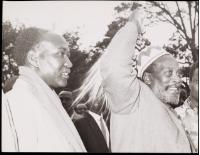The Winterton Collection

I absolutely love photography. This might be obvious from some of the choices I’ve made for previous editions of the Digital Archive, like World War I Africa and Africa Through a Lens. It’s always been a medium that I enjoy on an artistic level but, recently, this interest in photography has trickled over into my academic pursuits as well. This quote from Susan Sontag’s On Photography speaks to the power of photography as a medium to capture snapshots of the past:
“Photographs are a way of imprisoning reality… One can’t possess reality, one can possess images–one can’t possess the present but one can possess the past.”
While, as a historian, I can not pretend to be attempting to possess the past, I can always strive to present the past, an endeavor made much easier through the existence of digital historical photograph collections like the The Humphrey Winterton Collection of East African Photographs: 1860-1960.
The Humphrey Winterton Collection is an expansive collection of over 7,500 photographs taken mainly in East Africa between 1860 and 1960. Part of the Melville J. Herskovits Library of African Studies Collection at Northwestern University, the Winterton Collection was assembled by British collector Humphrey Winterton. These photographs preserve a range of key historical moments in the region, from the opening of the Busoga Railway in 1912 to Hermann von Wissman’s 1889-1890 expedition to suppress the Abushiri Revolt. In addition to major historical events, this collection also captures life in this region from the mid-nineteenth- to mid-twentieth century. From portraits to landscapes, this collection really does, as the site purports, represent “an unsurpassed resource for the study of the history of photography in East Africa.” The photographs are tagged and cataloged in a variety of ways, but, to be honest, these efforts at organizing the collection make it quite difficult to find anything. It’s much simpler to use the keyword search function to navigate the collection or, if you have the time, to browse the collection in its totality.

The site also features an educational collection, entitled “In the Classroom.” Educators will find the Lesson Plan useful to begin teaching students how to engage with not only the items contained in the Winterton collection, but historical photographs more general. The architects of the site have also assembled a series of curated galleries that can serve as jumping off points for learning more about East African women, political leadership, and, even, the Kenyan heritage of President Barack Obama. This section also includes links to some other African historical photograph collections (which I won’t go into detail about here since they might appear in a future edition of The Digital Archive!).
Keep up with all of the latest from the Winterton Collection and the Melville J. Herskovits Library at Northwestern University on Twitter and, as always, feel free to send me suggestions in the comments or via Twitter of sites you might like to see covered in future editions of The Digital Archive!



















